An alliance between Nurturing Uganda, an NGO in the rural area of Jinja, the Ugandan Association for Alternative Trade (UGAFAT), and WIEGO has proven a remarkable boon to the 23 women who came out to meet with WIEGO representatives on a warm, sunny December day in 2015.
The women represent just about 20 per cent of this burgeoning community group—many of the 106 members, all women, were too busy working to come to the meeting. To manage the fast-growing group, Nurturing Uganda has divided into three subgroups. All three comprise home-based workers who produce handicrafts for domestic and international markets.
Through the WIEGO-led Leadership & Business Skills for Women Fair Trade Producers project, UGAFAT has worked with its member, Nurturing Uganda, to provide a full slate of training on women’s legal status, leadership and financial management skills, record keeping and quality production.
Two years earlier, when the same WIEGO representatives visited Nurturing Uganda in the early stages of the project, the assembled women were quiet. Many sat stone faced. Few made eye contact, and even fewer spoke up. Today, they are outgoing and confident. One woman says the leadership training in the project gave her the confidence and courage to run for office. Today she is an aspiring local councillor campaigning toward a February 2016 election.
Almost all say their lives have changed, and many want to share a brief story about what is happening now in their lives.
Stories of Change in Their Own Words
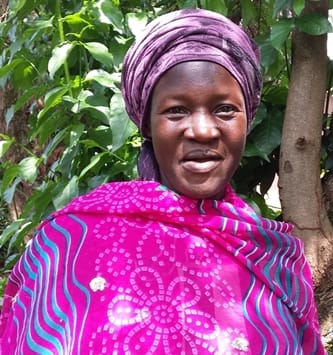 Fatima says she has seen a dramatic improvement in her life, thanks to the training she has received in these recent years. “I see a woman can take charge—she doesn’t have to wait for the husband to provide.”
Fatima says she has seen a dramatic improvement in her life, thanks to the training she has received in these recent years. “I see a woman can take charge—she doesn’t have to wait for the husband to provide.”
She has used the additional income she’s receiving to pay her children’s school fees. When asked how many children she has, she looks embarrassed and then doubles over laughing. The answer, when it comes: 10. She has 10 children, and now she can help pay school fees for all.
 Edith says what she learned in the project about good business tactics and ensuring only the best-quality goods reach customers has carried over to how she runs her small retail shop. “For instance, the beans—I make sure they are all good beans so the customer can be persuaded to buy.”
Edith says what she learned in the project about good business tactics and ensuring only the best-quality goods reach customers has carried over to how she runs her small retail shop. “For instance, the beans—I make sure they are all good beans so the customer can be persuaded to buy.”
That attention to detail has been crucial. She says before, customers were hard to come by. Now, she sometimes arrives at the store to find customers waiting for her to open.
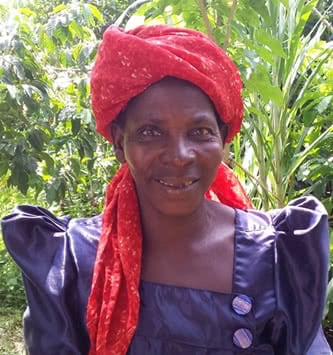 Cecilia says, “This group has empowered me. It has given me the ability and the capacity to make things.“
Cecilia says, “This group has empowered me. It has given me the ability and the capacity to make things.“
She appreciates that she received information she could put to practical use and improve her livelihood.
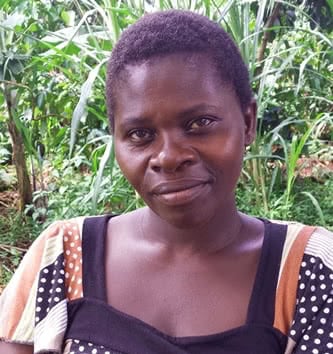 For Juliet, one of the most important aspects was the training in women’s legal rights. “Now I know my rights; I know that I can own property.” She also emphasizes the importance of learning about budgeting and the value of saving. Put together, this new knowledge allowed her to buy her own four cows and 50 chickens. The livestock provide another stream of income.
For Juliet, one of the most important aspects was the training in women’s legal rights. “Now I know my rights; I know that I can own property.” She also emphasizes the importance of learning about budgeting and the value of saving. Put together, this new knowledge allowed her to buy her own four cows and 50 chickens. The livestock provide another stream of income.
“Before, I was a lazy woman. I had no purpose. Now I am polished. And my husband is very happy because things in our house have improved.”
 Sophia’s husband is also happy with the change in their household. Sophia made money through her home-based handicraft work, saved, and then borrowed money from Nurturing Uganda’s loans programme to buy a small boat for fishing on the Nile, expanding her income potential.
Sophia’s husband is also happy with the change in their household. Sophia made money through her home-based handicraft work, saved, and then borrowed money from Nurturing Uganda’s loans programme to buy a small boat for fishing on the Nile, expanding her income potential.
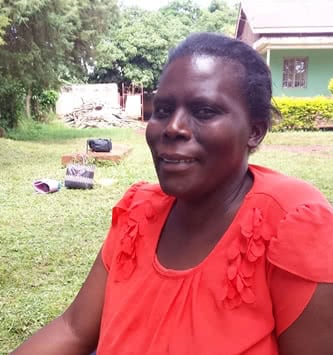 Betsa, the chairperson of the full 106-member Nurturing Uganda, has experienced a change in how she runs her retail business.
Betsa, the chairperson of the full 106-member Nurturing Uganda, has experienced a change in how she runs her retail business.
“I didn’t know that somebody owning a small business could so greatly improve their circumstances until I took the training.” Before, the single mother recounts, it was common to overspend every week. “Now I know how to make a budget, and every week I have about 30,000 shillings left over.”
 Rebecca says she always felt “inferior” until the trainings helped her learn to express herself and stand up confidently, and to save so that she could buy things needed in her household.
Rebecca says she always felt “inferior” until the trainings helped her learn to express herself and stand up confidently, and to save so that she could buy things needed in her household.
“Now the home is running smoothly and I have improved my well-being.”
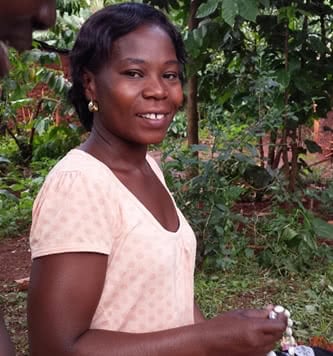 For young Harriet, the training in gender roles was an eye-opener. “I learned my power as a woman,” the small, strong women says. She thought only a man could drive business lories, and only a man could work in construction and build houses. Now she does both those things, and is very proud.
For young Harriet, the training in gender roles was an eye-opener. “I learned my power as a woman,” the small, strong women says. She thought only a man could drive business lories, and only a man could work in construction and build houses. Now she does both those things, and is very proud.
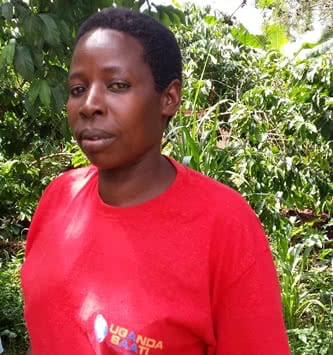 Mutesi says she was “backward” before she began training with the project. A tailor, she has put her newfound business skills into expanding her business—and has seen her income double.
Mutesi says she was “backward” before she began training with the project. A tailor, she has put her newfound business skills into expanding her business—and has seen her income double.
“Before, I couldn’t even afford to buy a pencil,” she says. “Now I participate in paying the school fees for the children.”
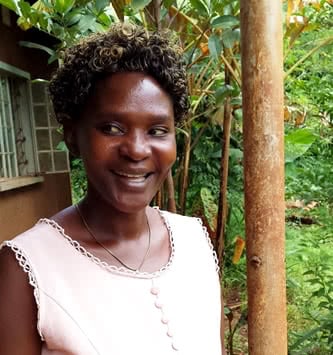 After providing English-translation services for the women and the WIEGO visitors, Harriett, the chair of a subgroup with 40 members, made her own strong point.
After providing English-translation services for the women and the WIEGO visitors, Harriett, the chair of a subgroup with 40 members, made her own strong point.
“We are very many and we contribute to the economy, but we do not get seen. Before the training, I was doing my work but I did not recognize myself as a worker. I did not see myself as contributing.”
While the WIEGO-supported project is ending, training is expected to continue through Nurturing Uganda. Members of the group have been trained to pass on the knowledge they learned, and training manuals are being produced by the project partners. This is important, because the current members must have their learning reinforced to ensure transformative change continues to develop in their lives.
